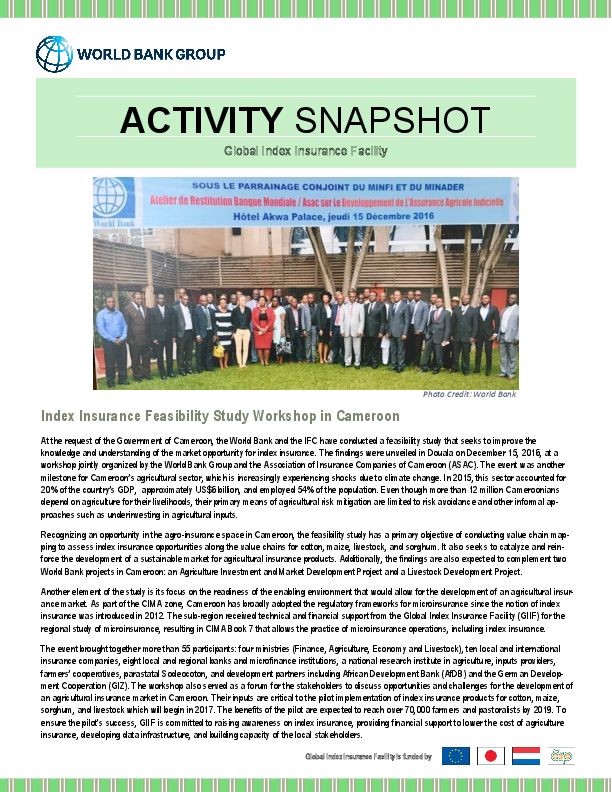Index Insurance Feasibility Study Workshop in Cameroon

At the request of the Government of Cameroon, the World Bank and the IFC have conducted a feasibility study that seeks to improve the knowledge and understanding of the market opportunity for index insurance. The findings were unveiled in Douala on December 15, 2016, at a workshop jointly organized by the World Bank Group and the Association of Insurance Companies of Cameroon (ASAC). The event was another milestone for Cameroon’s agricultural sector, which is increasingly experiencing shocks due to climate change. In 2015, this sector accounted for 20% of the country’s GDP, approximately US$6 billion, and employed 54% of the population. Even though more than 12 million Cameroonians depend on agriculture for their livelihoods, their primary means of agricultural risk mitigation are limited to risk avoidance and other informal approaches such as underinvesting in agricultural inputs.
Recognizing an opportunity in the agro-insurance space in Cameroon, the feasibility study has a primary objective of conducting value chain mapping to assess index insurance opportunities along the value chains for cotton, maize, livestock, and sorghum. It also seeks to catalyze and reinforce the development of a sustainable market for agricultural insurance products. Additionally, the findings are also expected to complement two World Bank projects in Cameroon: an Agriculture Investment and Market Development Project and a Livestock Development Project.
Another element of the study is its focus on the readiness of the enabling environment that would allow for the development of an agricultural insurance market. As part of the CIMA zone, Cameroon has broadly adopted the regulatory frameworks for microinsurance since the notion of index insurance was introduced in 2012. The sub-region received technical and financial support from the Global Index Insurance Facility (GIIF) for the regional study of microinsurance, resulting in CIMA Book 7 that allows the practice of microinsurance operations, including index insurance.
The event brought together more than 55 participants: four ministries (Finance, Agriculture, Economy and Livestock), ten local and international insurance companies, eight local and regional banks and microfinance institutions, a national research institute in agriculture, inputs providers, farmers’ cooperatives, parastatal Sodeocoton, and development partners including African Development Bank (AfDB) and the German Development Cooperation (GIZ). The workshop also served as a forum for the stakeholders to discuss opportunities and challenges for the development of an agricultural insurance market in Cameroon. Their inputs are critical to the pilot implementation of index insurance products for cotton, maize, sorghum, and livestock which will begin in 2017. The benefits of the pilot are expected to reach over 70,000 farmers and pastoralists by 2019. To ensure the pilot’s success, GIIF is committed to raising awareness on index insurance, providing financial support to lower the cost of agriculture insurance, developing data infrastructure, and building capacity of the local stakeholders.
